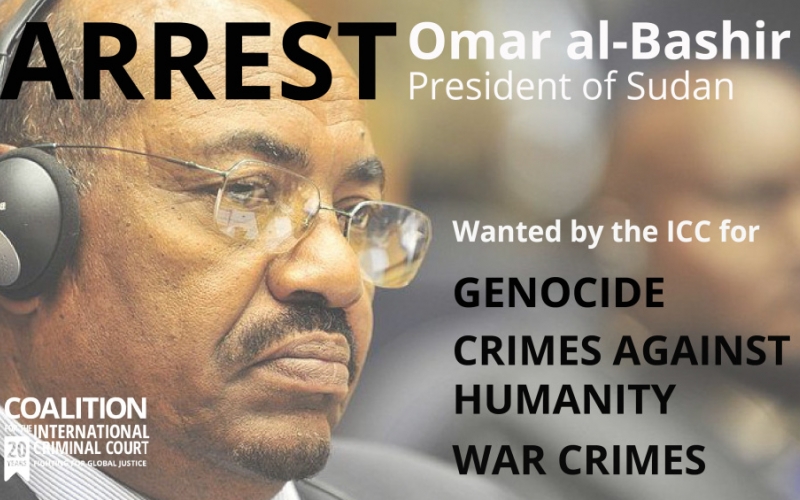#GlobalJustice Weekly – Deafening silence over al-Bashir in Indonesia

In Global Justice news this week: ICC fugitive Omar al-Bashir continues to travel the globe with ICC member states doing little to arrest the Sudanese president, civil society calls for an end to sexual and gender based crimes, the ICC trial of Laurent Gbagbo resumed, an Al-Haq human rights lawyer has received death threats for ICC-Palestine related work, the long-delayed Chilcot report could inform investigations into alleged UK war crimes in Iraq says ICC Prosecutor Fatou Bensouda and much more.
International Criminal Court fugitive Omar al-Bashir continues to travel the globe, this week attending a summit of the Organization of the Islamic Cooperation in Indonesia. While the United States expressed concern about the visit, provoking a blunt response from Sudan, ICC member states have remained deafeningly silent, once again failing to arrest or even isolate the Sudanese president.
Al-Bashir has now made some 75 international trips in the seven years since the ICC issued arrest warrants for alleged war crimes, crimes against humanity, and genocide in Darfur, Sudan. With no police force, the ICC relies on member states to arrest suspects. While Indonesia defended inviting al-Bashir on the basis that it is not an ICC member state, civil society in the country stressed that the UN Security Council resolution referring Darfur to the Court urges all UN members to cooperate fully. The ICC’s own governing body, the Assembly of States Parties, urges all ICC member states to avoid all non-essential contact ICC fugitives.
Having identified the situation in Darfur as a threat to international peace and security in 2005, the UN Security Council continues to fail to back up its own call for ICC intervention. Meanwhile, under al-Bashir’s watch, Sudan is said to be experiencing the highest levels of violence and displacement since the height of the alleged genocide more than a decade ago. How long will the international community continue to derogate its responsibilities to ensure accountability and protect civilians in conflict?
International Women’s Day 2016
To commemorate International Women’s Day this week, we took a look at the role of the Rome Statute system of international justice in achieving the UN’s sustainable developments goals on gender equality. The ICC called for greater coordination and increased global efforts to end sexual and gender-based crimes. Survivors of sexual violence in Guatemala secured a landmark victory at the Sepur Zarco trial, hailed by human rights activists, Nobel Peace laureates and various UN organizations. But the world remains a dangerous place for women writes Open Society’s Kelly Askin.
International Criminal Court investigations
Kenya: Meanwhile concerns of a political landscape of threats and ethnic language growin the country with respect to the upcoming 2017 elections.
Cote d’Ivoire: The trial of ormer Ivorian President Laurent Gbagbo and former youth militia leader Charles Blé Goudé resumed this week at the ICC, with the testimony of thefifth witness. Can Gbagbo’s ICC trial quench Côte d’Ivoire’s thirst for justice?
Mali: Academic Mark Kersten reflects on the landmark case at the ICC on alleged destruction of UNESCO protected buildings in Timbuktu. Bintou Founé Samaké, president of the Malian NGO Women and Law in Development in Africa highlighted the importance of the case against Ahmed al-Faqi.
ICC preliminary examinations
Palestine: An Al-Haq human rights lawyer based in The Hague has received death threats for ICC related work.
Iraq: The long-delayed Chilcot report could inform investigations into alleged UK war crimes in Iraq says ICC Prosecutor Fatou Bensouda.
Nigeria: The Igbo Ekunie Initiative raised concerns over alleged mass killings of unarmed civilians by Nigerian military and police forces.
Campaign for Global Justice
We called on Laos to join the ICC by acceding to the Rome Statute. Add your voice now.
In Kiev, Parliamentarians for Global Action discussed the legal steps towards Ukraine’s full ratification of the Rome Statute.
Around the world
Beth Van Schaack reflects on alleged war crimes and the use of prohibited weapons inSyria. Are European prosecutions the answer to on-going impunity in Syria? Mark Kerstenwrites on the challenges of war criminals posing as refugees.
Human Rights Watch warned of the spread of grave abuses in Western Equatoriaallegedly committed by South Sudanese military forces, and encouraged the African Union to establish a court to prosecute these alleged war crimes.
The ICC has reportedly offered assistance to Tunisian authorities in attempting toprosecute those most responsible for the killings at Port El Kantaouri in 2015.
A prominent human rights organization in Egypt faces threat of closure.
The ICC president Silvia Fernandez de Gurmendi visited the Council of Europe.
Bangladesh’s supreme court upheld a death sentence for 1971 war crimes.
The People’s Democratic Party of Turkey aims to file a complaint against the Turkish government at the ICC.
Kosovo’s president-elect, and former leader of the ethnic Kosovo Liberation Army,pledged to support the new war crimes court which will try crimes allegedly committed by senior KLA members.
Amnesty International reflects on corporate accountability and transitional justice inMyanmar.
Sign up for our weekly updates to get the latest #GlobalJustice news.
